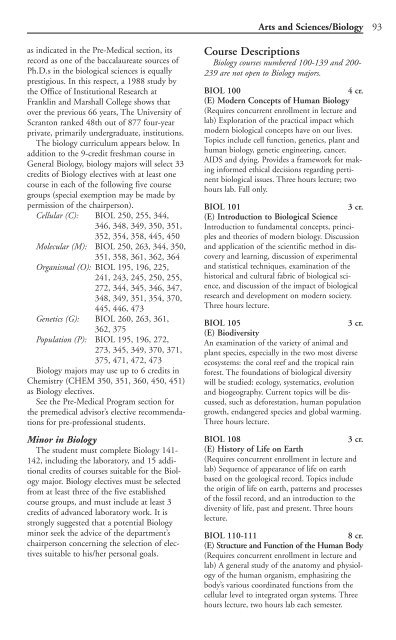2003-2004 - The University of Scranton
2003-2004 - The University of Scranton
2003-2004 - The University of Scranton
You also want an ePaper? Increase the reach of your titles
YUMPU automatically turns print PDFs into web optimized ePapers that Google loves.
as indicated in the Pre-Medical section, its<br />
record as one <strong>of</strong> the baccalaureate sources <strong>of</strong><br />
Ph.D.s in the biological sciences is equally<br />
prestigious. In this respect, a 1988 study by<br />
the Office <strong>of</strong> Institutional Research at<br />
Franklin and Marshall College shows that<br />
over the previous 66 years, <strong>The</strong> <strong>University</strong> <strong>of</strong><br />
<strong>Scranton</strong> ranked 48th out <strong>of</strong> 877 four-year<br />
private, primarily undergraduate, institutions.<br />
<strong>The</strong> biology curriculum appears below. In<br />
addition to the 9-credit freshman course in<br />
General Biology, biology majors will select 33<br />
credits <strong>of</strong> Biology electives with at least one<br />
course in each <strong>of</strong> the following five course<br />
groups (special exemption may be made by<br />
permission <strong>of</strong> the chairperson).<br />
Cellular (C): BIOL 250, 255, 344,<br />
346, 348, 349, 350, 351,<br />
352, 354, 358, 445, 450<br />
Molecular (M): BIOL 250, 263, 344, 350,<br />
351, 358, 361, 362, 364<br />
Organismal (O): BIOL 195, 196, 225,<br />
241, 243, 245, 250, 255,<br />
272, 344, 345, 346, 347,<br />
348, 349, 351, 354, 370,<br />
445, 446, 473<br />
Genetics (G): BIOL 260, 263, 361,<br />
362, 375<br />
Population (P): BIOL 195, 196, 272,<br />
273, 345, 349, 370, 371,<br />
375, 471, 472, 473<br />
Biology majors may use up to 6 credits in<br />
Chemistry (CHEM 350, 351, 360, 450, 451)<br />
as Biology electives.<br />
See the Pre-Medical Program section for<br />
the premedical advisor’s elective recommendations<br />
for pre-pr<strong>of</strong>essional students.<br />
Minor in Biology<br />
<strong>The</strong> student must complete Biology 141-<br />
142, including the laboratory, and 15 additional<br />
credits <strong>of</strong> courses suitable for the Biology<br />
major. Biology electives must be selected<br />
from at least three <strong>of</strong> the five established<br />
course groups, and must include at least 3<br />
credits <strong>of</strong> advanced laboratory work. It is<br />
strongly suggested that a potential Biology<br />
minor seek the advice <strong>of</strong> the department’s<br />
chairperson concerning the selection <strong>of</strong> electives<br />
suitable to his/her personal goals.<br />
Arts and Sciences/Biology 93<br />
Course Descriptions<br />
Biology courses numbered 100-139 and 200-<br />
239 are not open to Biology majors.<br />
BIOL 100 4 cr.<br />
(E) Modern Concepts <strong>of</strong> Human Biology<br />
(Requires concurrent enrollment in lecture and<br />
lab) Exploration <strong>of</strong> the practical impact which<br />
modern biological concepts have on our lives.<br />
Topics include cell function, genetics, plant and<br />
human biology, genetic engineering, cancer,<br />
AIDS and dying. Provides a framework for making<br />
informed ethical decisions regarding pertinent<br />
biological issues. Three hours lecture; two<br />
hours lab. Fall only.<br />
BIOL 101 3 cr.<br />
(E) Introduction to Biological Science<br />
Introduction to fundamental concepts, principles<br />
and theories <strong>of</strong> modern biology. Discussion<br />
and application <strong>of</strong> the scientific method in discovery<br />
and learning, discussion <strong>of</strong> experimental<br />
and statistical techniques, examination <strong>of</strong> the<br />
historical and cultural fabric <strong>of</strong> biological science,<br />
and discussion <strong>of</strong> the impact <strong>of</strong> biological<br />
research and development on modern society.<br />
Three hours lecture.<br />
BIOL 105 3 cr.<br />
(E) Biodiversity<br />
An examination <strong>of</strong> the variety <strong>of</strong> animal and<br />
plant species, especially in the two most diverse<br />
ecosystems: the coral reef and the tropical rain<br />
forest. <strong>The</strong> foundations <strong>of</strong> biological diversity<br />
will be studied: ecology, systematics, evolution<br />
and biogeography. Current topics will be discussed,<br />
such as deforestation, human population<br />
growth, endangered species and global warming.<br />
Three hours lecture.<br />
BIOL 108 3 cr.<br />
(E) History <strong>of</strong> Life on Earth<br />
(Requires concurrent enrollment in lecture and<br />
lab) Sequence <strong>of</strong> appearance <strong>of</strong> life on earth<br />
based on the geological record. Topics include<br />
the origin <strong>of</strong> life on earth, patterns and processes<br />
<strong>of</strong> the fossil record, and an introduction to the<br />
diversity <strong>of</strong> life, past and present. Three hours<br />
lecture.<br />
BIOL 110-111 8 cr.<br />
(E) Structure and Function <strong>of</strong> the Human Body<br />
(Requires concurrent enrollment in lecture and<br />
lab) A general study <strong>of</strong> the anatomy and physiology<br />
<strong>of</strong> the human organism, emphasizing the<br />
body’s various coordinated functions from the<br />
cellular level to integrated organ systems. Three<br />
hours lecture, two hours lab each semester.
















